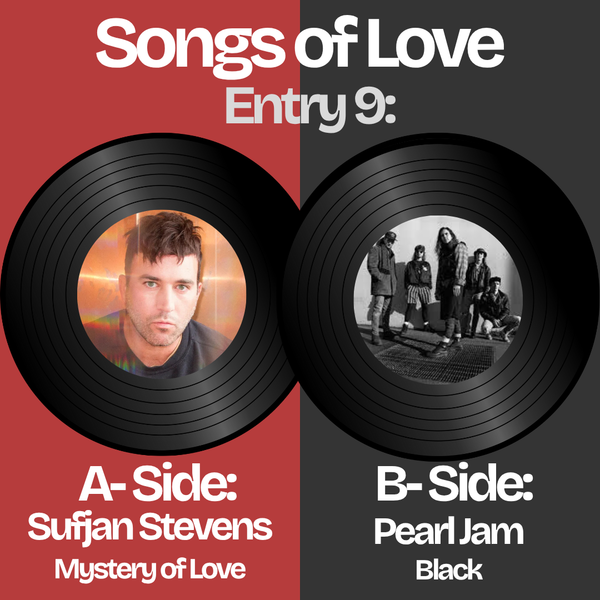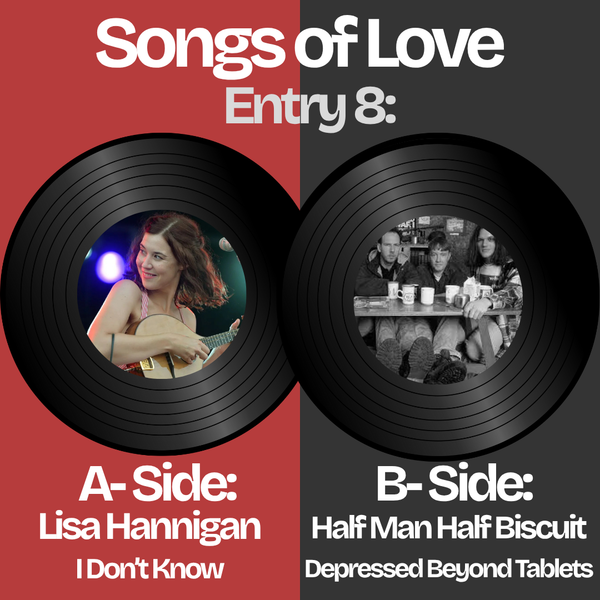Songs of Love 3
This week, it’s perhaps two of the most famous bands in the world, from the respective decades with which they’re most associated. Like last week, the A-side this time is an album track while the B-side is a very well-known single (plus an actual B-side, in a one-off departure from the usual format), but then even an album track from this particular band is far from obscure. One of the B-sides is an attempt at separation, while the other is about how the lovers in question will always in some sense be together, reflecting the A-side’s obsession with presence. Presence and absence are, of course, things that love songs play with all the time – even in the few entries we’ve had so far, ‘Sunrise’ had a questionable ethereal presence at its heart, while both ‘I Say a Little Prayer’ and ‘It’s All Right with Me’ turned, in very different ways, on absence. So safe to say this is a topic we’ll be coming back to, then.
A-Side
Performed by the Beatles
Written by John Lennon and Paul McCartney
Released 1966
For all of these entries, I render the songwriting credits just as they’re officially listed, for the sake of consistency apart from anything else. In this case, I’ve been more tempted than ever before to change the listing to reflect accurate reality. Because, of course, this is very much a Paul McCartney song, at precisely the point in the Beatles career where the Lennon/McCartney split was becoming meaningful, reflecting a real stylistic divergence. In contrast to the LSD-rock of ‘She Said She Said’ or ‘Doctor Robert,’ this is a sweet, gentle love song, lyrically if not musically largely in line with what the Beatles had been producing for several years at this stage.
(As a side note, though, it’s worth bearing in mind that the aforementioned Lennon/McCartney distinction shouldn’t be taken as meaning that the two were off in their own corners working on pseudo-solo material. They certainly still co-wrote and added bits to each other’s songs (‘Getting Better,’ from the next album, is one that McCartney cites frequently), even some of those that seem most characteristic of one or the other – McCartney was heavily involved in the still futuristic-sounding tape loops for ‘Tomorrow Never Knows,’ for instance.)
So why pull this one out here, as opposed to ‘Eight Days a Week’ or ‘We Can Work it Out’ or a dozen others? It’s not enough that it’s a beautiful song – so are those other examples, and if extraordinary, imaginative yet intuitive melodies were all we were about here, this list would be McCartney top to bottom, matched only by this song’s alleged inspiration Brian Wilson. It’s not even enough that it expresses a lovely and moving sentiment – not only are there plenty of those around, but it’s impossibly subjective; I might think that of a song that you find frustratingly cheesy (maybe even this one) or vice versa.
No, as is so often the case here, we’re concerned with questions of temporality, presence and obsession.
Let’s start with temporality. It’s not alluded to directly much in the song – there’s the second-line reference to “each day of the year,” followed by later repeated uses of the word “never” – “I need never care,” “each one believing that love never dies.” This latter ones in particular reveal exactly why time isn’t a concern here – it doesn’t exist, to all intents and purposes. The presence of the lover erases time as a concern, stopping all the clocks. The two lovers are together in a single, eternal moment that contains all of time.
But this erasure is contingent on presence, which is what the song is principally concerned with, from the title on down. Even the first line tells us this – the singer “needs” their lover to be present (not wants, needs) in order to live “a better life” – better in the sense of more moral, or more pleasant? Likely both, since the lover seems to be the entire end and focus of the singer’s worldview. Their only desire is the same as their only ethical drive: to be near their lover.
The whole song turns on the word “there,” a word which carries several meanings in English. Even the concept of being “over there” encapsulates several concepts – Japanese, for instance, distinguishes between “over there by you” and “over there distanced from either participant in the conversation.” But “there” also denotes presence, both in a physical and emotional sense – to be there for someone, for instance, as in another A-side we’ll be covering soon. And so, in this song, “there” stands in for a number of things. It’s first used to refer to the feelings of the two lovers – “there’s something there” – which, given the intensity of the emotion on display here, almost comes across as comic understatement. Immediately after this, it refers to the singer being “there” for their lover[1] - where, in the first lines of the song, the lover moved “here” to be with the singer, now the singer moves “there” to be with the lover. So there’s a reciprocal movement towards each other – their actual position doesn’t matter so long as they’re together (as Marion Cotillard says in Inception right before a dream train crushes her head)[2]. The next use of “there” refers to an unidentified “someone” outside of the two lovers, a potentially interrupting presence, but “she doesn’t know he’s there” – he’s ignored, unimportant, just like the rest of the world, so much so that his identity is irrelevant. Twice more in the song, then, the singer is “hoping I’m always there” – referring then to both physical and emotional presence. That “always” is once again an obliteration of time, and even space – always there, never anywhere else.
And if you’re not sure where obsession fits in, well, reread the last few paragraphs. The presence of the lover annihilates all else, up to and including the concept of time. It’s a sort of externalised solipsism – nothing else exists except the singer and their lover, eternal and unchanging. Like a lot of great love songs, it’s an overwhelming impression, even a troubling one when you try looking at it rationally. But then rationality is the wrong tool when it comes to love.
[1]- Yes, my policy of using they/them pronouns in these entries is doing this paragraph no favours.
[2] - Inception being, not incidentally, a film in part about a man obsessed with his dead wife and his out-of-reach children.
B-Side
Performed by Fleetwood Mac
Written by Lindsey Buckingham
Released 1976
We’ve been wading through a few songs (and there are many more to come) where feelings are buried, or half-spoken, or otherwise hidden, so it’s a relief to get into one of such candour. This is a song of catharsis, of bringing things out into the open; a recognition of the decisive point to which two people have come. That point being, as the title suggests, one of divergence.
That’s not to say that everything is clear and straightforward here. On the contrary, the first verse is a tug-of-war of feelings: I can’t continue loving you (in fact, it’s not “the right thing to do” – practically or morally?), but I can’t change my feelings; I want to give you everything, but you’re not in that frame of mind. Notice here how blame is subtly assigned – the singer has given everything of themself, so it must be the lover’s fault that things have broken down (and bear that in mind for the second half of this entry).
And then there’s the chorus. So many of the songs covered here are a lone voice, reinforcing a wider sense of aloneness; there may be backing vocals (on ‘I Say A Little Prayer,’ for instance), but these generally echo and support the lead vocal. It’s still one person alone that we’re concerned with. But here we have a classic Fleetwood Mac vocal arrangement, where for the line “You can go your own way” and “You can call it another lonely day,” Lindsey Buckingham, Stevie Nicks and Christine McVie’s voices all blend together almost into a single sound (I had to listen to the chorus several times while writing this to try to pick out their individual voices). Then Buckingham’s voice drops out, to echo: “Go your own way”/“Another lonely day.” So there’s that divergence I was talking about, beautifully staged within the vocal arrangement. Even leaving aside the song’s autobiographical roots in Buckingham and Nicks’s own break-up, it’s a poignant moment, with the isolation paradoxically reinforced by the harmony.
But of course, it’s impossible to fully ignore those autobiographical roots, so let’s dive right in…
Performed by Fleetwood Mac
Written by Stevie Nicks
Released 1976
Plenty of songs have had answer records down the years, whether those be cash-ins or part of an ongoing feud, whether they be separated from the original release by weeks, months or years. But this is the only case I can think of where a single has had an answer record in the shape of its own B-side.
I try not to get too into biography in interpreting these songs. It’s too easy to get hung up on it and for it to dominate all discussion of the song. At best, it’s rarely the most interesting thing going on – as with any artwork, the important bit is how the experience is transformed. At worst, it can be actively distasteful; a sort of Hello magazine approach where the song is little more than a vehicle for gossip.
But… well, this is Fleetwood Mac. This is Rumours (although ‘Silver Springs,’ unlike ‘Go Your Own Way,’ wasn’t included on the original version of the album, much to Nicks’s displeasure). There’s really no way to get around the fact that this song is about its writer’s breakup with one of its performers. Unlike ‘Go Your Own Way,’ which is rather more abstract, that’s the heart of this song, and key to its interpretation.
Because this is not just a song of a broken heart. This is a revenge song. And there are plenty of those, wishing misfortune and even violence on an ex-lover – already we’ve had ‘It’s All Right with Me,’ which has a touch of that, and there will be more to come. This one, though, is different. This song isn’t just about revenge. It is an act of revenge.
Much of the song is lamenting a failed relationship, a mixture of melancholy and bitterness that’s familiar from many other songs – there’s another girl on the scene now, and the singer doesn’t want to hear about her. Fair enough, really. But the singer seems to be in the act of healing – “I begin not to love you” – and moving on, albeit still wondering “was it worth it?” And then comes the chorus, and something very different enters the emotional mix: “Time cast a spell on you/But you won’t forget me.” There’s a strange confidence to that “you won’t forget me,” an assured prediction, seemingly safe from contradiction, while the next lines “I know I could have loved you/But you would not let me” echo ‘Go Your Own Way’ in its “If I could baby I’d give you my world/How can I when you won’t take it from me,” making the single a very literal “he said/she said.” If we see this as two sides of a break-up, then both participants are convinced they’re in the right. It was the other one who spoiled the great love affair.
But then comes the second, expanded chorus, where the singer’s confidence is suddenly explained:
I’ll follow you down ‘til the sound
Of my voice can haunt you
You’ll never get away from the sound
Of the woman that loves[1] you
Here’s where the biography becomes unavoidable, and where the song reveals itself most fully. This is not a melancholy portrayal of a failed relationship in the abstract. This is a weapon against an ex-lover, wielded with cunning intensity by Stevie Nicks against Lindsey Buckingham, using her status as a rock star in what was about to become one of the biggest bands in the world. Because this failed relationship is being committed to tape, to be played on the radio as well as live. And given the extraordinary success of Rumours, even this B-side gets a lot of radio play nowadays. Chances are pretty good that at some point in his life Buckingham has walked into a petrol station or supermarket to hear this song playing. Haunting him, if you will. Like a constant reminder of his failings, and the heartbreak he caused/experienced (we have to assume both). And just to add the final indignity, where Nicks sings the verse alone, Buckingham joins her for the chorus, forced to back her up as she mocks him. He’s become part of that sound that haunts him, just to really cement that he’ll never escape it.
I suspect this entry would be incomplete without some reference to this 1997 performance of the song, which has become famous for the way Nicks holds Buckingham’s gaze throughout the final chorus. Lots of people I know love this moment for its apparent brutality and sincerity, but I have to be a bit of a killjoy here, because as fun as it is, that moment looks quite staged to me - it’s more Buckingham’s reaction of apparent indignation that rings false to me than Nicks’s cutting gaze, which may well be sincere (she glances over at him repeatedly before he looks back), and it’s worth mentioning that there are other, later performances where they do the same thing (as in these two from 2004 and 2013). But whether or not it’s real, what matters, I think, is the way that people react to it. We want it to be real – even I do, I must admit – because it seems so clearly to express what the song is about, what it is. It seems to be an outburst of genuine emotion in the midst of a crowd-pleasing reunion. And whether it is that, or it’s Nicks and Buckingham cleverly playing into the public perception of them, doesn’t entirely matter in a way, because that’s how it’s read, and so to a greater or lesser degree, it is real to the viewer.
Many songs, perhaps most, are enriched by covers, by a plenitude of artists finding multiple interpretations and ways into the song’s emotion. This isn’t one of them. That’s not to say it’s impossible for anyone other than Fleetwood Mac to do a good ‘Silver Springs’ – it’s a good song one way or another, and there’s a lot of fun to be had in the venom of the chorus. But it’s just not the same when the person to whom it’s addressed isn’t directly implicated in the song, isn’t next to the singer onstage, isn’t actively singing the same words along with them. If anyone else sings ‘Silver Springs,’ for the most part, their lover can probably escape the song. Lindsey Buckingham never can.
[1] Some sources have “loved you,” which also makes sense, but I definitely hear “loves you,” especially in live versions, the present tense adding an extra tinge of sadness to the whole affair (as if needed).
As a conclusion, have one of my favourite memes:




